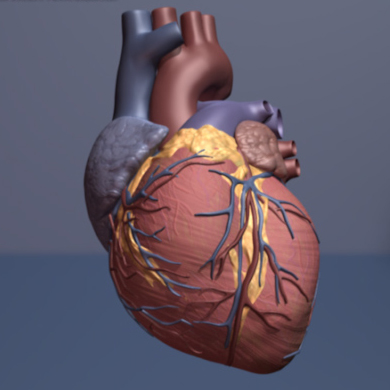

While deaths related to heart disease have declined among older people, studies suggest that death rates among younger patients have remained stagnant or increased slightly. To understand what factors put younger individuals at higher risk of premature coronary heart disease (CHD), researchers from Brigham and Women’s Hospital and the Mayo Clinic analyzed more than 50 risk factors in 28,024 women who participated in the decades-long Women’s Health Study. Notably, women under 55 with type-2 diabetes had a tenfold greater risk of having CHD over the next two decades, with lipoprotein insulin resistance (LPIR) proving to be a strong, predictive biomarker as well. Findings are published in JAMA Cardiology.
“We’re going to see, unfortunately, younger and younger people having heart attacks,” said corresponding author Samia Mora, MD, MHS, of the Brigham’s Center for Lipid Metabolomics in the Division of Preventive Medicine and an associate professor at Harvard Medical School. “When a younger individual has a cardiovascular event, it will affect their quality of life going forward, their productivity, and their contribution to society.”
“Prevention is better than cure, and many risk factors for heart disease are preventable. This study shows the impact that lifestyle has on heart health in women of all ages and younger women in particular,” said Sagar Dugani, MD, Ph.D., a hospital internal medicine practitioner at Mayo Clinic in Rochester, MN. Dr. Dugani is a co-first author of the study.
The researchers analyzed approximately 50 biomarkers associated with cardiovascular health. Commonly used metrics like low-density lipoprotein (LDL) cholesterol (or “bad” cholesterol) and hemoglobin A1C (a measure of blood sugar levels) had much weaker associations with CHD onset in women younger than 55 years than LPIR, a newer metric for insulin resistance. LPIR uses a weighted combination of six lipoprotein measures and is analyzed through specialized laboratory testing. Whereas LDL cholesterol was only associated with a 40 percent increase in the risk of CHD onset in women under 55, LPIR demonstrated a sixfold (600 percent) increase.
“In otherwise healthy women, insulin resistance, type-2 diabetes, and its sister diagnosis, metabolic syndrome, were major contributors to premature coronary events,” said Mora. “Women under 55 who have obesity had about a fourfold-increased risk for coronary events, as did women in that age group who smoked or had hypertension. Physical inactivity and family history are all part of the picture as well.”
The researchers acknowledged the study is limited in its generalizability—beyond its focus on women, who have been shown to have worse outcomes after premature cardiac events than men, its participants were over 95 percent white. According to Mora, findings could be even more dramatic in ethnic and racial groups that have a greater prevalence of metabolic syndrome, insulin resistance, and diabetes, among other risk factors.
“Diabetes is mostly preventable, but it’s a system-wide problem, and we urgently need further research into new strategies to address it,” Mora said. “These could be innovative lifestyle-based strategies, like community efforts, greater public health efforts, ways to medically target metabolic pathways, or new surgical approaches.”
With the prevalence of diabetes and its associated risk factors increasing dramatically and affecting more women than men, the researchers emphasize the urgency of developing effective interventions.
We need new strategies to improve outcomes in these younger individuals and address the risk of diabetes because we’re only seeing the beginning of this epidemic now,” said Mora.
more recommended stories
 Texas Medical Board Releases Abortion Training for Physicians
Texas Medical Board Releases Abortion Training for PhysiciansKey Takeaways Texas Medical Board has.
 Safer Allogeneic Stem Cell Transplants with Treg Therapy
Safer Allogeneic Stem Cell Transplants with Treg TherapyA new preclinical study from the.
 Autoimmune Disorders: ADA2 as a Therapeutic Target
Autoimmune Disorders: ADA2 as a Therapeutic TargetAdenosine deaminase 2 (ADA2) has emerged.
 Kaempferol: A Breakthrough in Allergy Management
Kaempferol: A Breakthrough in Allergy ManagementKaempferol, a dietary flavonoid found in.
 Early Milk Cereal Drinks May Spur Infant Weight Gain
Early Milk Cereal Drinks May Spur Infant Weight GainNew research published in Acta Paediatrica.
 TaVNS: A Breakthrough for Chronic Insomnia Treatment
TaVNS: A Breakthrough for Chronic Insomnia TreatmentA recent study conducted by the.
 First-of-Its-Kind Gene-Edited Pig Kidney: Towana’s New Life
First-of-Its-Kind Gene-Edited Pig Kidney: Towana’s New LifeSurgeons at NYU Langone Health have.
 Just-in-Time Training Improves Success & Patient Safety
Just-in-Time Training Improves Success & Patient SafetyA study published in The BMJ.
 ChatGPT Excels in Medical Summaries, Lacks Field-Specific Relevance
ChatGPT Excels in Medical Summaries, Lacks Field-Specific RelevanceIn a recent study published in.
 Study finds automated decision minimizes high-risk medicine combinations in ICU patients
Study finds automated decision minimizes high-risk medicine combinations in ICU patientsA multicenter study coordinated by Amsterdam.

Leave a Comment